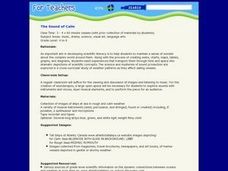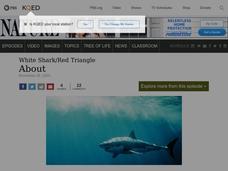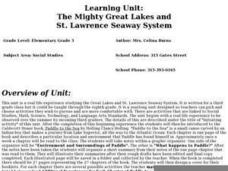Curated OER
Critter Characteristics
Students explore the adaptations of deep sea life forms. In this science lesson plan, students watch a video to observe characteristics which allow for the sea creature to thrive in it's environment. Students determine the...
Curated OER
Where's the Beach?
Students use beach profile data to analyze how erosion and sediment transport changed seashore slopes. In this geology activity, students plot the data provided and analyze erosion patterns. They also assess coastal erosion management...
Curated OER
The Fossil Record
High schoolers research about the animals found in Burgess Shale. In this earth science lesson, students evaluate the significance of fossils in human history. They create models of their chosen animal.
Curated OER
Reading a Map
Third graders become familiar with the vocabulary and skills related to mapping. In this guided reading lesson plan, 3rd graders find proper nouns on from the map. Students read Goldilocks. Students make...
Curated OER
Hawaiian Bowl!
Students describe the movement of tectonic plates in the Hawaiian archipelago region. They describe how a combination of hotspot activity and tectonic plate movement could produce the arrangement of seamounts obse
Curated OER
Sexy Coral Reef and I Want My Own Space
Fifth graders explore how coral polyps increase the chances of egg and sperm meeting after being released into the vast ocean waters.
Curated OER
Salmon Smolt: Stella PC and Mac
Students investigate the Stella Smolts Migration Model and its use in previous simulation models to help managers deal with the many factors contributing smolts decline. They participate in an interactive exercise in the role of fishery...
Curated OER
Water Pressure - Observing Water Flow
Students discover that pressure increases the deeper the ocean becomes. They determine how water pressure differs at various depths by observing water flow.
Curated OER
Fighting Conservation Crime
Young scholars identify and interpret the evolution and sources of law in Canada. Students compare and contrast the legal rights and responsibilities of individuals, groups, and organizations in Canadian society. Young scholars write a...
Curated OER
The Sound of Calm
Students examine the relationships that exist between ocean currents, wind and climate. Using those relationships, they discuss how they affect the oceans. They create their own music to represent the sounds of the ocean and share them...
Curated OER
Trade (Hawai'i)
Students gain further understanding of the diversities of trade and the cultural impact of the trade items. Students evaluate and analyze trade items and use this knowledge to make sound trade decisions. Students describe and analyze the...
Curated OER
Introduction to Ecology
Eighth graders identify the living and nonliving components of an ecosystem. In this ecology lesson, 8th graders explain the role each organism plays. They participate in class discussion and answer a quiz at the end of the lesson.
Curated OER
Learning About Mammals
Young scholars study the mammal classification and forms of them living in the United States. In this mammal study lesson, students read through orders of mammals that exist in the United States. Young scholars also study the taxonomy of...
Curated OER
Turtle Hurdles
Students participate in a simulation in which they discover the threats to sea turtles throughout the world. In groups, they act out the life cycle of a sea turtle and describe the stresses that threaten their survival. As a class,...
Curated OER
Shark Attack
Young scholars examine the white shark. They think critically about a set of shark facts and predict whether the statements are true or false. Students describe a year in the life of a white shark living in the Red Triangle. They...
Curated OER
Coral Reefs Endangered
Students research where in the world coral reefs are located. In this ecology lesson, students create food chains and food web. They simulate growing coral reefs to understand their characteristics better.
Curated OER
Miracle of Winged Migration
Pupils explore the life cycle of insects by researching butterflies. In this insect migration lesson, students identify the Monarch butterfly, where they inhabit, and what their migration consists of. Pupils utilize the Internet to...
Curated OER
The Dot and Dashy Language
Students examine and discuss the Morse Code. In small groups they develop messages using Morse code and take turns decipering the messages.
Curated OER
Water Quality
Students investigate the water cycle and evaporation. They study the porosity and permeability of groundwater, and the capillary action in soil in this unit.
Curated OER
For the Fun of It
Middle schoolers investigate author's purpose in autobiography by reading Amelia Earhart's autobiography entitled The Fun of It. Learners examine character traits needed to fulfill personal goals.
Curated OER
Dino Detectives
As students examine maps of Utah, 4th graders search for clues about what prehistoric life was like in Utah.
Curated OER
The Mighty Great Lakes and St. Lawrence Seaway System
Students participate in a variety of activities in a unit about the Great Lakes/St. Lawrence Seaway System. They create a diorama, read related stories, and correspond with other classes located in other port cities along the St Lawrence...
Curated OER
What Lies Beneath the Upper Crust?
Students discover if information in an article is accurate and current. In this science instructional activity, students read the story carefully and decide on what the subject of the article is. Students search the Internet to see...
Curated OER
Island Research
Students collaborate to gather information about the geography, history, economy, climate, culture, and other aspects of life on the island of Eleuthera.

























